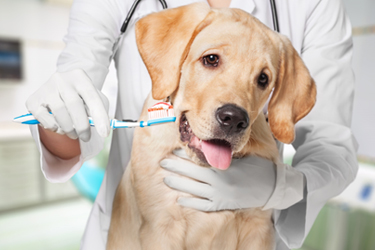Dental Procedure Aftercare Tips

When a pet undergoes any type of oral or dental surgery, share the following aftercare tips with owners to help the animal recuperate.
Tip #1. A Place to Rest after Veterinary Dental Surgery
- Provide a quiet place for the animal to rest that is away from other pets and children.
- If possible, confine the animal in a crate or in a room until they can fully recover from the effects of the anesthetic drugs.
- Some animals experience a decrease in depth perception, coordination, and judgment after they have had anesthesia and surgery. Confinement can help to avoid injuries caused by, for example, inaccurately judging steps and falling down stairs.
- Confinement also restricts the animal’s activities in order to allow wounds to heal and prevent sutured areas from opening after surgery.
Tip #2. Provide Warmth after Veterinary Dental Surgery
- Animals that have been in surgery and gone under anesthesia often have trouble maintaining their body heat.
- To help, follow these aftercare suggestions:
- Indoor pets: loosely encircle animal with a blanket, and place in a warm animal bed
- Outdoor pets: do not release if the outside temperature is cool. Provide protection and warmth with a crate and blanket or bring into the house until they have recovered
- It is not advised to place an animal on a heating pad unless instructed to do so by the veterinarian.
Tip #3. Food and Water Aftercare Advice
- Surgical procedures typically require the animal to fast beforehand, so most pets will be interested in eating and drinking once they get home.
- However, it is important to follow the instructions given by the veterinarian as the animal may end up with an upset stomach that causes vomiting.
- Do not offer more food or drink than is recommended even if the animal seems hungry or thirsty.
Tip #4. Sore Mouth after Veterinary Oral Surgery
- Any type of oral or dental work may leave the animal with a sore mouth for the next few days.
- If the animal is usually fed dry, crunchy food, follow the veterinarian’s advice for using softened or canned food for the appropriate time period.
- Avoid offering them favorite chew toys until the mouth has healed.
Tip #5. Blood after Pet Oral Surgery
- When an animal has oral and/or dental work, it is not uncommon to see a small amount of blood. This blood could be observed, for example:
- Coming from the animal’s mouth
- As pink-tinged water in its water dish
- Seen on its resting blanket.
- Any amount of bleeding that is more than a small amount could indicate a problem
- If you have questions, or if the blood seems significant, contact your veterinarian right away.
Tip #6. Multiple Tooth Extractions during Veterinary Dental Surgery
- Even when most of an animal’s teeth have been extracted, if they were painful and infected, the animal will feel much better and will have no problems eating canned or softened food
- If the animal had several teeth extracted, it is not uncommon for their tongue to slide out through the space now empty of teeth.
Tip #7. Antibiotics after Surgery
- If the animal had multiple extractions or any type of severe subgingival infection, the veterinarian may prescribe antibiotics.
- Not all animals need antibiotic prescriptions.
Most pets recuperate quickly from dental surgical procedures and are back to normal in just a short time. Until that time, however, it is fun to be pampered!
Do you use our veterinary dental tools? Contact us at Covetrus for more information and client tips! 855.724.3461.
Need Regulatory Assistance
If you need help with regulatory or licensing issues, we're happy to help. We have a wide variety of resources to help you when issues arise.

Careers
Are you looking for a place to let your talents shine? At Covetrus, we help our practitioner customers better serve their patients and take pride in providing the best customer experience possible. Search our open positions to see our available opportunities.
Newsletter
Stay current with what’s going on with Covetrus, subscribe to receive our newsletter and email communications. Subscribers will receive the latest information in practice management, sales and marketing, animal health, and more.


Leave a comment